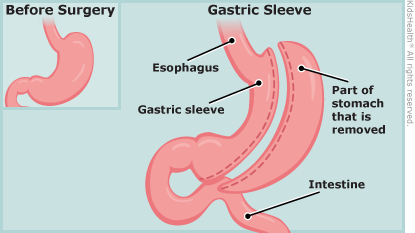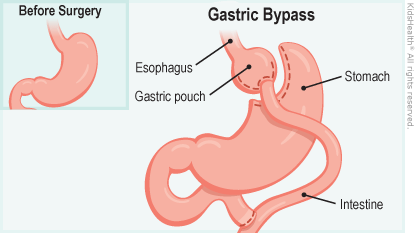Weight Loss Surgery
What Is Weight Loss Surgery?
Sometimes, being overweight can lead to serious health problems. People who are 100 or more pounds over their ideal body weight are more likely to develop medical problems. These problems include diabetes, heart disease, sleep apnea, liver disease, and joint problems.
Weight loss surgery (also called bariatric surgery) can help very overweight people who have tried but failed to lose weight and face serious medical problems. But it's not a quick fix. People need to put in a lot of hard work before and after the operation.
The two main kinds of surgery for weight loss in teens are gastric sleeve and gastric bypass.
What Is Gastric Sleeve Surgery?
Gastric sleeve (also called sleeve gastrectomy) is the most common weight loss procedure. With this operation, the surgeon removes part of the stomach and makes a tube or "sleeve" out of the rest of the stomach. The new, banana-shaped stomach is much smaller than the original stomach.
After the operation, a person will eat less, feel full sooner, and be less hungry. Part of the stomach that's removed makes hormones that increase appetite and help control insulin. So, a person's appetite decreases and insulin resistance improves after gastric sleeve surgery.
The gastric sleeve procedure is not reversible.

What Is Gastric Bypass Surgery?
In a gastric bypass (also called "Roux-en-Y" gastric bypass), a surgeon creates a small pouch at the top of the stomach. This pouch becomes the new stomach. Surgeons then connect the pouch to the middle part of the small intestine, bypassing the upper part of the small intestine.
After the surgery, the stomach pouch holds a lot less food than a normal-sized stomach. A person will eat less, feel full sooner, and be less hungry. And fewer calories and nutrients are absorbed because the small intestine is shorter.
People who get gastric bypass tend to lose more weight than people who get the gastric sleeve, but there can be more problems too. The gastric bypass procedure is not reversible.

What Are the Risks of Weight Loss Surgery?
Like any operation, weight loss surgery has risks:
- People who've had weight loss surgery may have pain after eating. They might throw up, get diarrhea, or have acid reflux (heartburn) after eating — especially if they eat too much or too fast.
- After surgery, people need to get used to eating very small amounts. They need to chew their food more than they used to and space meals out during the day. If they don't, they might feel sick. They might even start gaining weight again.
- Food can move too fast through the stomach and intestines after weight loss surgery (especially gastric bypass). Doctors call this "dumping syndrome." It can cause nausea, weakness, sweating, cramping, and diarrhea. Eating high-sugar or high-fat foods can make dumping worse. Patients need to be careful about what they eat as their bodies get used to a different way of digesting food.
- People who have had weight loss surgery might not get all the nutrition they need. One reason is they are eating less. Also, when food doesn't move through the entire digestive system, the body can't absorb as many vitamins and minerals. After surgery, most people take vitamin and mineral supplements.
In rare cases, some people have serious problems after weight loss surgery, such as:
- bleeding
- a bad reaction to anesthesia
- infection near the cuts used for the surgery
- a leaky stomach or intestine that can lead to an infection of the area around the stomach and other organs
- a blood clot in the legs or lungs
- blockage in the intestines
- gastroesophageal reflux
- weight regain
Mental health problems, such as depression and anxiety, are a concern before and after surgery. Most people feel better about themselves after weight loss surgery, but some may continue to struggle. Teens who do should reach out to a mental health professional and get help if they feel overwhelmed or sad, or have other emotional concerns.
What Else Should I Know?
Weight loss surgery is no magic fix. But the hard work may be worth it for people who are very overweight and have serious health problems because of their weight.
If you're worried about your weight or are thinking about weight loss surgery, talk to your doctor.


